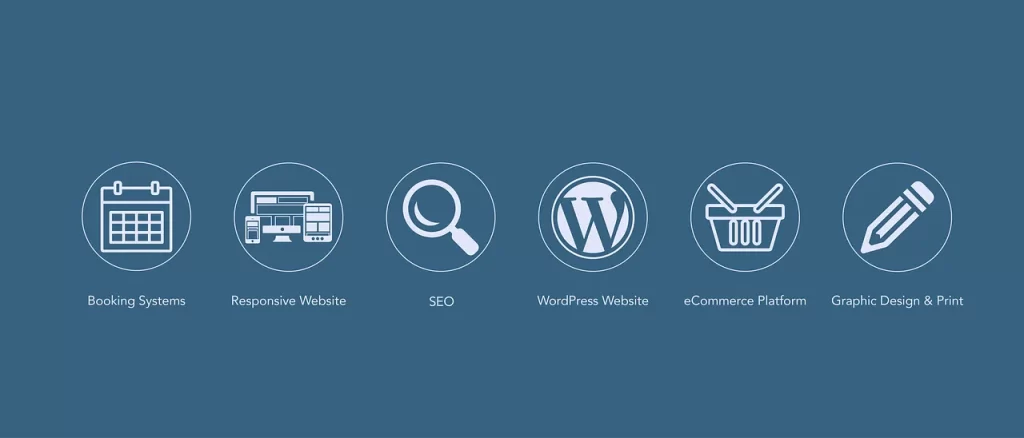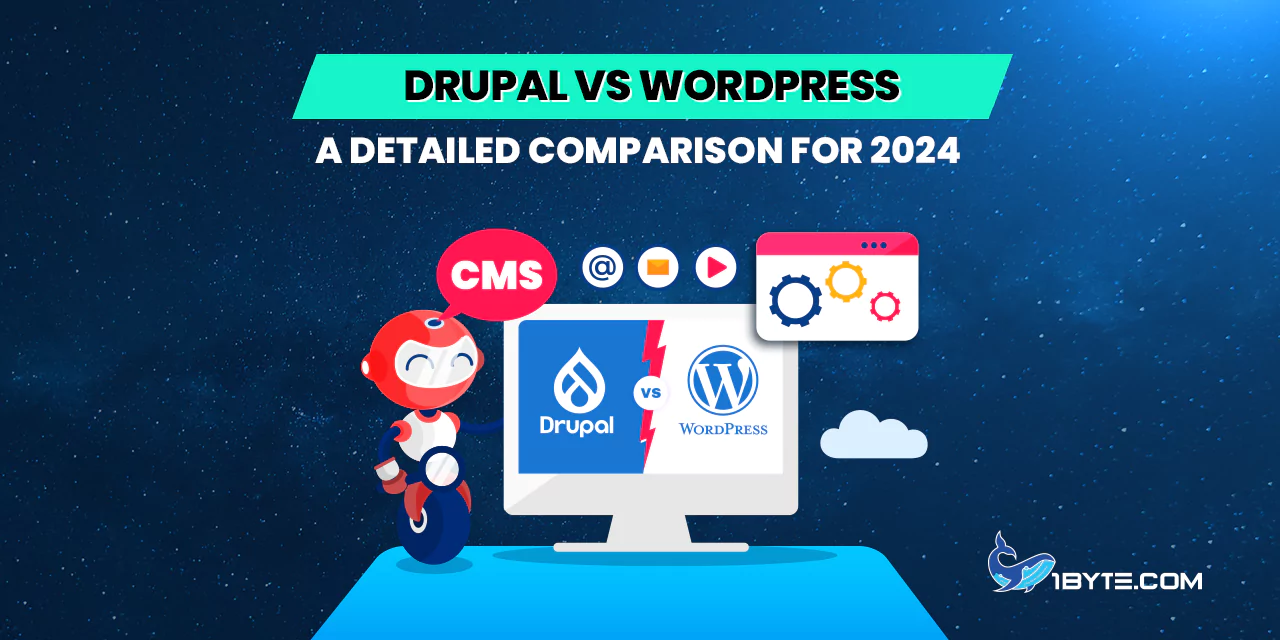Selecting the right CMS is one of the most important decisions that any business can make. Drupal vs WordPress is one of the most discussed topics among the web developers and businessmen. Each of the platforms has its advantages and peculiarities. However, they are designed to meet different needs and requirements of their users.
WordPress is the most popular CMS in the world and is used to create a significant number of websites. It is easy to use and best suited for first time users. While, on the other hand, Drupal is used to power a relatively smaller percentage of websites and is considered more flexible and scalable. It is most appropriate for large and complicated websites.
According to the latest data, WordPress takes the lion’s share of the CMS market, and Drupal has a relatively smaller market share. These numbers demonstrate the leadership of WordPress and at the same time the strong position of Drupal in the market.
For example, important web-sites such as Whitehouse.gov and The New Yorker use WordPress. While, on the other hand, there are websites such as Nasa.gov and The Economist that are powered by Drupal.These examples show the strengths and reliability that both the platforms have gained in the course of time.
In this comprehensive comparison between Drupal and WordPress, we will discuss the aspects such as features, price, and efficiency. This guide from 1Byte is designed to provide you with all the necessary information to decide for your website in 2025.
Ease of Use
While comparing Drupal and WordPress, usability is one of the most important criteria. WordPress is famous for its simplicity. It has a very easy to use interface as it is presented by a dashboard. This makes it easy for beginners to manage their websites as they have easy time in handling their site.
On the other hand, Drupal is relatively more complex than the two mentioned above in terms of ease of use. It is more complicated and is more technical in nature. Drupal is not easy to use and users often require the support of a developer in order to create and maintain a Drupal site.
WordPress also has a block editor. This editor is very friendly to use and one can create and design content in a very simple way. It is like a word processor and therefore can be used by anyone irrespective of the level of computer literacy. On the other hand, the editor in Drupal is not as user friendly as that of WordPress. It takes more time to study and to be able to get a good mastery of it.

These differences are illustrated by specific examples. For example, an owner of a small business can easily create a WordPress site with the help of ready-made themes and plugins. This ease of use is particularly advantageous to those who have little time and few resources to spare. On the other hand, a large organization may opt for Drupal due to its flexibility and ability to be modified. But they would require a team to run the site, which may not be very cost effective.
FURTHER READING: |
| 1. Cost of WordPress Website: Breaking Down the Expenses |
| 2. WordPress Hosting Singapore: Top 10 Options for Your Website |
| 3. 5 Best WordPress Hosting Indonesia Providers |
Verdict
If the usability and the time of implementation are the priorities, then WordPress is the better solution. It enables users to create and develop websites with little or no technical assistance. However, for users who require a more specific and versatile environment, Drupal provides more options but at the same time is more complex.
Performance and Speed
This is a significant difference between Drupal and WordPress since performance and speed are significant aspects to consider. Each of the two platforms has its advantages and disadvantages in this regard.
Drupal has been widely recognized for its excellent performance right from the box. It is usually faster in page loading than WordPress because it is not as complex as the latter. But, installation and customization of Drupal to its maximum capability is not an easy task.
At the same time, WordPress can also provide very good performance, but it needs tuning. There are three ways through which users can increase the WordPress page loading speed; these include resizing the images, using website caching plugins, and choosing a good hosting service. For instance, installing plugins such as WP Rocket or W3 Total Cache can dramatically improve the speed.
Verdict
Drupal is usually the best option for the businesses that need a complex site with a lot of content that should be processed quickly. This is because it has a light resource requirement and has a good server communication for such requirements.
WordPress is good for users who want to work with the platform that is easy to use and requires less time to set up. However, if it is optimized correctly, it is capable of providing a very good performance. However, users should be careful with the factors that affect speed on the internet.
Security
Security is one of the most important aspects that should be considered when selecting a CMS. In this area, both Drupal and WordPress have their advantages and disadvantages.
Security is another strong point of Drupal as it is considered to be one of the most secure CMS systems. It has a smaller theme and plugin marketplace, which means that it does not attract hackers easily. Security team of Drupal is continuously working on the security and they respond quickly to the security holes and release security patches for it. This makes it suitable for use in enterprise websites and government agencies since it is highly reliable.

WordPress, however, is very secure at its base and can be made even more secure by the user. However, it has an enormous plugin and theme base that can pose a security risk. WordPress is also popular and therefore vulnerable to hackers attacks. Nevertheless, WordPress has a vast community that responds to security threats very actively. This means that risks can be managed through updates and security plugins.
Verdict
In terms of security, Drupal outperforms WordPres. WordPress is secure but is relatively more vulnerable and needs a lot of effort to be put into maintaining security due to its numerous plugins and themes.
Flexibility and Customization
WordPress is more flexible and customizable than Drupal. Drupal has a very solid and versatile architecture that enables developers to build complex and highly individualized sites. This is due to the fact that the software has a modular structure which allows users to add or remove features as they deem fit. For instance, Drupal’s PathAuto assists in the creation of URLs that are friendly to the search engines.
On the other hand, WordPress is easy to use and is not very technical. It offers a vast assortment of topics and plugins that can be quickly deployed and configured, which makes it suitable for novices with very little coding experience.
Verdict
When it comes to Drupal vs WordPress, the user has to choose depending on what he or she wants. Drupal is suitable for complicated and very specific websites. It needs some technical skills, but it is the most flexible of all solutions. WordPress, however, is ideal for those who want a platform that is easy to use with a lot of support from the WordPress community. It is suitable for small businesses and bloggers who want to have a quick setup of their websites.
SEO Capabilities
WordPress is very popular for its easy to use SEO features. It has some in-built SEO tools such as auto-generated XML sitemaps and compatibility with most popular SEO plugins such as Yoast. These tools assist the users in managing the content as per SEO requirements, which do not require technical expertise, making WordPress most suitable for novices or users who do not wish to indulge in the complex SEO practices.

Drupal has more enhanced and flexible options for SEO than Joomla. It enables the incorporation of SEO modules to improve meta tags, site verification, XML sitemaps, page titles and Google Analytics. This makes Drupal a very useful application for those with a technical background. It is advantageous for those who want to create complicated sites with certain requirements for SEO.
Verdict
Comparing Drupal vs WordPress, it is possible to state that the choice depends on the user and his/her level of experience. WordPress is ideal for small business owners who have little technical knowledge about website development and require a robust SEO tool. Drupal is perfect for those who have some coding skills or have developers who can work with the advanced SEO options. The two platforms provide outstanding SEO tools, and the choice depends on the user’s needs.
Cost
Another thing that differentiates Drupal from WordPress is the cost. Both are open source and free to use but there are other cost factors to be taken into consideration.
Initial Setup Costs
WordPress is usually cheaper at the beginning of the website development. It is possible to establish a simple website with no costs at all. Most of the themes and plugins are available for free while others are available at very cheap prices. However, Drupal can be more expensive in the initial stages of development and customization especially for large projects.
Hosting Cost
It is important to note that both Drupal and WordPress are content management systems that need third party hosting. WordPress hosting plans can begin from as low as a few dollars per month. Drupal hosting may be a bit more costly than other hosting because of its intricacy.
Development and Maintenance Costs
WordPress is very popular due to its simplicity of use. This means that users can easily operate their sites without requiring the services of professional developers hence cutting costs. Still, Drupal often needs professional coders for installation and further support, which may lead to higher costs.
Scalability and Long-term Costs
WordPress is cheap to use for small to medium websites. However, as the site develops, there may be extra expenses for the premium plugins, themes, and security features. Drupal, however, is relatively more expensive at the beginning but can be cheaper in the long run for large projects with certain requirements.
Verdict
If you are in need of a website now and have a very limited budget or if you do not have a very complicated website in mind, then WordPress is the way to go. It has less initial capital requirement and is easy to implement. However, in large-scale and complicated projects, Drupal can be cheaper in the long run and provide a decent ROI.
Community and Support
WordPress has a big and engaged audience. Forum, documentation and tutorials are easily accessible to the users. Also, third party support services are easily accessible. This large community makes sure that the users get the help they require from time to time.

Drupal also has its own community as well. It provides a lot of documentation and has forums. However, Drupal is not as popular as WordPress and there are fewer people in the Drupal community. This can impact the availability of plugins and themes.
Verdict
WordPress has a larger community than Joomla, and therefore has a more elaborate support network. This makes it easier for the users to be able to find help and other resources that they need. Drupal has a devoted community, however, it may not offer the same amount of assistance. Hence in the “drupal vs wordpress” debate, WordPress is more appropriate for users who are more inclined to the community and support.
Leverage 1Byte’s strong cloud computing expertise to boost your business in a big way
1Byte provides complete domain registration services that include dedicated support staff, educated customer care, reasonable costs, as well as a domain price search tool.
Elevate your online security with 1Byte's SSL Service. Unparalleled protection, seamless integration, and peace of mind for your digital journey.
No matter the cloud server package you pick, you can rely on 1Byte for dependability, privacy, security, and a stress-free experience that is essential for successful businesses.
Choosing us as your shared hosting provider allows you to get excellent value for your money while enjoying the same level of quality and functionality as more expensive options.
Through highly flexible programs, 1Byte's cutting-edge cloud hosting gives great solutions to small and medium-sized businesses faster, more securely, and at reduced costs.
Stay ahead of the competition with 1Byte's innovative WordPress hosting services. Our feature-rich plans and unmatched reliability ensure your website stands out and delivers an unforgettable user experience.
As an official AWS Partner, one of our primary responsibilities is to assist businesses in modernizing their operations and make the most of their journeys to the cloud with AWS.
Conclusion
Depending on the requirements of a project, one has to choose between the two. Drupal is secure and flexible. It is suitable for large projects and is highly recommended for large and complicated projects. While Wix is easy to use, WordPress is easy to use as well. It is best suitable for bloggers and small business owners. WordPress has a rich plugin library. This makes customization easy.
WordPress is suitable for newbies and small businesses as they are easy to use. It is user-friendly and has a lot of backing. Therefore, for complicated and extensive projects, Drupal is more appropriate. It is more flexible and secure than the previous one. Therefore, depending on the needs of the project, it is clear that Drupal is better than WordPress.

